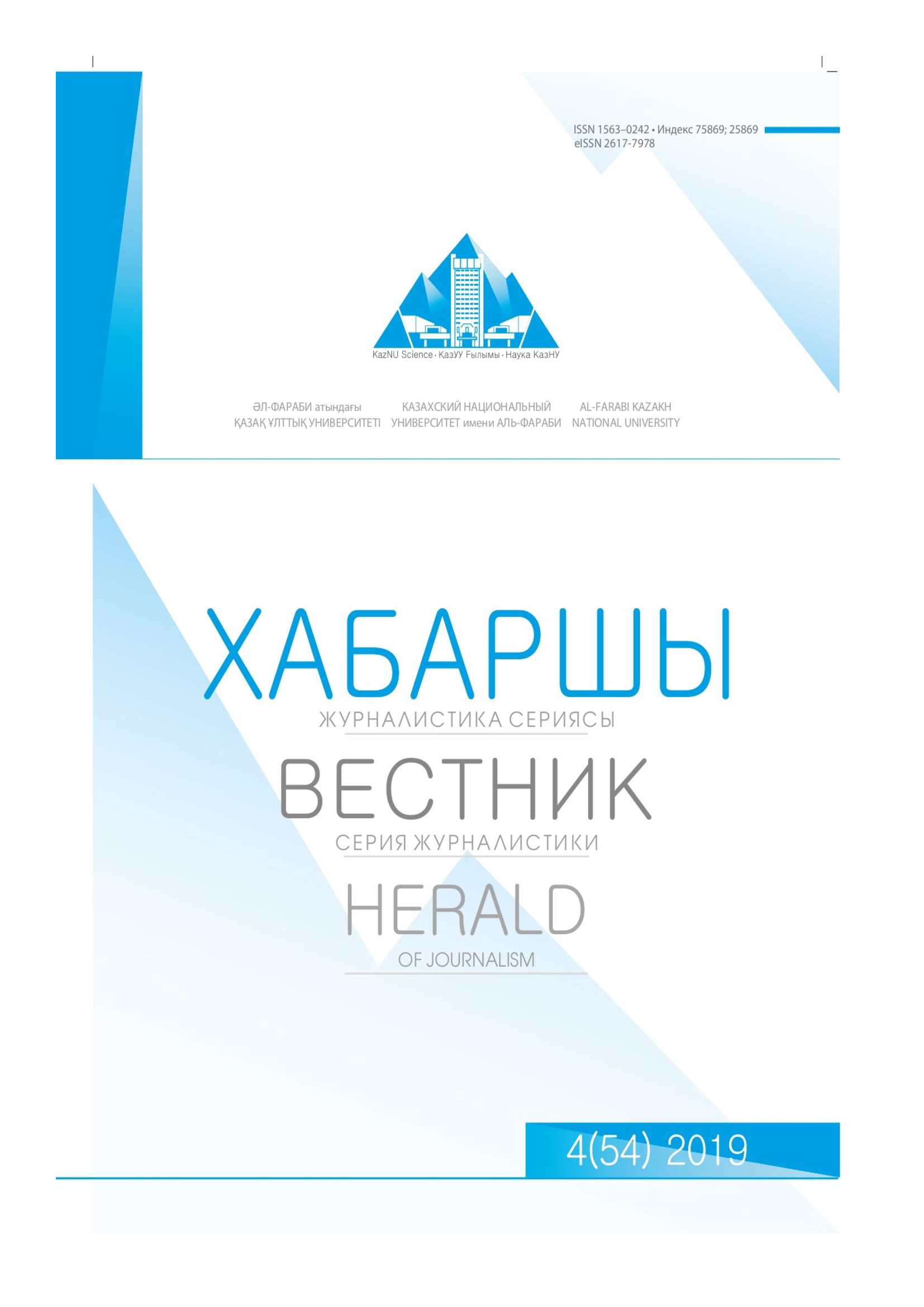Media literacy and fact checking: part one
DOI:
https://doi.org/10.26577/HJ.2019.v54.i4.01Кілттік сөздер:
media literacy, fact-checking, manipulation, propaganda, misinformation.Аннотация
The modern media field is increasingly filled with false information. The term “fake news” today includes a wide range of manipulative technologies: “computational propaganda”, “puppet net-works”, “troll armies”, anonymous source, alternative fact, gossip, deceit, rumors, false context, etc. Problems are exacerbated at a high pace. The development of technological processes and the shift in global communication discourse to social networks and the Internet.
The purpose of the article is to study the history and evolution of the disinformation crisis, which is a serious threat to open societies around the world. The author proposes to activate critical thinking among young people, to teach the audience to intellectually recognize and process fake news, to understand the need for a critical and independent analysis of incoming news and background information.
The author also believes that media literacy helps to understand the role of the media in society, as well as the acquisition of important research and expression skills needed by the audience. Media literacy skills also include the ability to access media, analyze content, evaluate messages, and create media for communication and expression. Learning how to verify facts is an important component of media literacy training, a way to protect against manipulation and fake news. This issue publishes the first part of the author’s study.
Библиографиялық сілтемелер
Balgaonkar, & Jare, R. (2018). ‘Impact of Social Media on Civic Engagement of Youth’. International Journal of Creative Re-search Thoughts, 8 (2).
Bordac, W. E. (2014). ‘Introduction to Media Literacy History’. Journal of Media Literacy Education, 6 (1): 1-2. Center for Media Literacy. Available at http://www.medialit.org/
Center for Media Literacy. ‘Basic Framework’. Available at http://www.medialit.org/cmls-basic-framework
Center for Media Literacy. ‘Five Key Questions Form Foundation for Media Inquiry’. Available at http://www.medialit.org/ reading-room/five-key-questions-form-foundation-media-inquiry
Demas, S. J. (2015). ‘The media can’t surrender to a fact-free presidential race’. MLive.
Available at https://www.mlive.com/opinion/index.ssf/2015/11/fact_check_trump_media_bias.html Edelman (2018). ‘2018 Edelman Trust Barometer’, Available at https://www.edelman.com/trust-barometer
Edelman (2018). ‘Edelman Trust Barometer 2018: UK Findings’. Available at https://www.edelman.co.uk/magazine/posts/ edelman-trust-barometer-2018/
Factcheck.kz. ‘About project’. Available at https://factcheck.kz/en/about-project/ Factcheck.kz (2017). ‘No Discrimiantion in Women Labour Compensation in Kazakhstan’.
Available at https://factcheck.kz/en/glavnoe/false-no-discrimination-in-women-labour-compensation-in-kazakhstan/ Fedorov, A. (2008). ‘Media Education around the World: A Brief History’. Acta Didactica Napocensia. Available at http://dppd.ubbcluj.ro/adn/article_1_2_7.pdf
Funke, D., & Mantzarlis, A. (2018). ‘Here’s What to Expect from Fact-Checking in 2010’.
Poynter Institute. Available at https://www.poynter.org/fact-checking/2018/heres-what-to-expect-from-fact-checking-in-2019/ Freberg, K., & Kim, C. M. (2018). ‘Social Media Education: Industry Leader Recommendations for Curriculum and Faculty
Competencies. Journalism & Mass Communication Educator, 73 (4): 379-391.
Holan, A. D. (2016). ‘2016 Lie of the Year: Fake News’. PolitiFact. Available at https://www.politifact.com/truth-o-meter/arti-cle/2016/dec/13/2016-lie-year-fake-news/
Hwang, T. (2018). ‘The Future of the Deepfake — and What It Means for Fact-checkers’. Poynter Institute. Available at https:// www.poynter.org/fact-checking/2018/the-future-of-the-deepfake-and-what-it-means-for-fact-checkers/
Freedom House (2018). Freedom on the Net 2018. Available at https://freedomhouse.org/report/freedom-net/freedom-net-2018/ rise-digital-authoritarianism
Freedom House (2018). Nations in Transit. Available at https://freedomhouse.org/report/nations-transit/2018/Kazakhstan Ibold, H. (2010). ‘Disjuncture 2.0: Youth, Internet Use and Cultural Identity in Bishkek’. Central Asian Survey, 29 (4): 521-535.
Jolls, T. (2011). ‘Voices of Media Literacy: International Pioneers Speak: Robyn Quin Interview
Transcript’. Center for Media Literacy. Available at http://www.medialit.org/reading-room/voices-media-literacy-international-pioneers-speak-robyn-quin-interview-transcript
Knight Foundation (2018). ‘Indicators of News Media Trust’. Available at https://knightfoundation.org/reports/indicators-of-news-media-trust
Kumenov, A. (2018). ‘With Media Weak, Online Mischief-makers Run Amok’ EurasiaNet.org.













